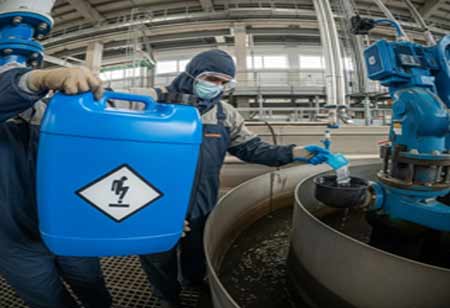Chemical Industry Review | Thursday, September 11, 2025
Fremont, CA: Boiler systems are essential to many industrial processes, but their efficiency and durability depend heavily on water quality. Water treatment chemicals are vital in maintaining optimal boiler performance by preventing scale, corrosion, and operational inefficiencies. Their use ensures safer, longer-lasting, and more cost-effective steam generation.
Protecting Boiler Components and Reducing Scale Formation
One of the primary benefits of using water treatment chemicals is the prevention of scale buildup. Minerals like calcium and magnesium, commonly present in untreated water, tend to form hard deposits inside boiler tubes and heat exchangers. These deposits reduce heat transfer efficiency, leading to higher fuel consumption and the risk of overheating. Over time, even a thin layer of scale can act as an insulator, significantly reducing system performance and leading to potential equipment failure.
Water softeners, dispersants, and scale inhibitors are commonly used to prevent these problems. These chemicals either remove hardness from the water or alter the mineral structure to prevent deposits from forming. In doing so, they protect internal surfaces from becoming coated and clogged. This maintains efficient heat exchange and lowers the energy required to produce steam.
Apart from mineral scale, dissolved oxygen and carbon dioxide in boiler feedwater can also be highly corrosive. If left unchecked, these gases attack metal surfaces, resulting in the boiler's pitting, cracking, and even complete structural failure over time. Oxygen scavengers and corrosion inhibitors are added to neutralize these threats. By forming protective layers on metal surfaces or reacting with dissolved gases, these treatments effectively prevent rust and prolong the life of the equipment.
Improving Operational Efficiency and Lowering Costs
Chemical water treatment does more than protect the boiler's physical structure. It also contributes directly to the overall efficiency of the system. A clean boiler operates more effectively, with fewer interruptions and a more stable output. When scaling and corrosion are minimized, there’s less need for frequent blowdowns, which means water, energy, and chemical losses are reduced. This improves the boiler's operating efficiency and minimizes the environmental impact of the process.
Well-treated water leads to fewer shutdowns and less unscheduled maintenance. The cost savings from reduced fuel consumption, fewer repairs, and extended equipment lifespan can be substantial. In industries where steam generation is the production backbone, even a slight increase in boiler efficiency translates into significant operational savings over time.
Water treatment chemicals help maintain boiler water within safe pH and alkalinity levels, preventing foaming and carryover. This ensures that only dry, high-quality steam reaches the end-use application, improving process outcomes and product quality in industrial settings. Reliable steam generation without contamination or interruptions enhances workplace safety, a vital concern in any facility handling pressurized systems.

